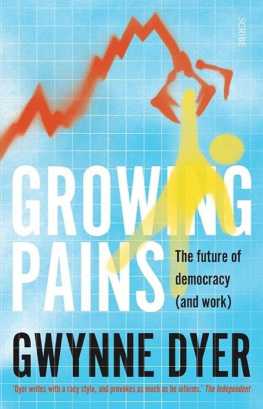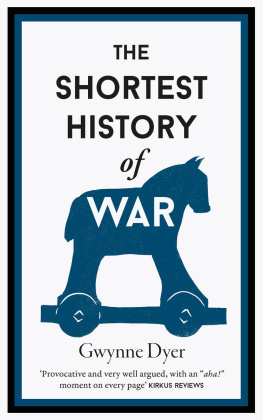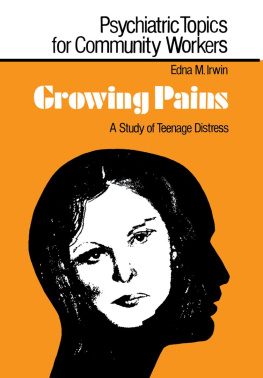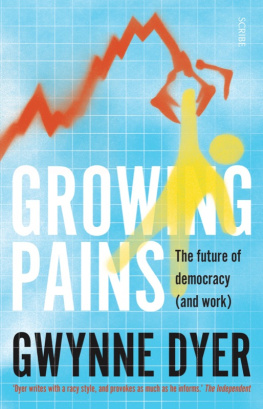Gwynne Dyer - Growing Pains: The Future of Democracy (And Work)
Here you can read online Gwynne Dyer - Growing Pains: The Future of Democracy (And Work) full text of the book (entire story) in english for free. Download pdf and epub, get meaning, cover and reviews about this ebook. year: 2018, publisher: Scribe Publications, genre: Politics. Description of the work, (preface) as well as reviews are available. Best literature library LitArk.com created for fans of good reading and offers a wide selection of genres:
Romance novel
Science fiction
Adventure
Detective
Science
History
Home and family
Prose
Art
Politics
Computer
Non-fiction
Religion
Business
Children
Humor
Choose a favorite category and find really read worthwhile books. Enjoy immersion in the world of imagination, feel the emotions of the characters or learn something new for yourself, make an fascinating discovery.
- Book:Growing Pains: The Future of Democracy (And Work)
- Author:
- Publisher:Scribe Publications
- Genre:
- Year:2018
- Rating:3 / 5
- Favourites:Add to favourites
- Your mark:
- 60
- 1
- 2
- 3
- 4
- 5
Growing Pains: The Future of Democracy (And Work): summary, description and annotation
We offer to read an annotation, description, summary or preface (depends on what the author of the book "Growing Pains: The Future of Democracy (And Work)" wrote himself). If you haven't found the necessary information about the book — write in the comments, we will try to find it.
Growing Pains: The Future of Democracy (And Work) — read online for free the complete book (whole text) full work
Below is the text of the book, divided by pages. System saving the place of the last page read, allows you to conveniently read the book "Growing Pains: The Future of Democracy (And Work)" online for free, without having to search again every time where you left off. Put a bookmark, and you can go to the page where you finished reading at any time.
Font size:
Interval:
Bookmark:
GROWING PAINS
Gwynne Dyer has worked as a freelance journalist, columnist, author, broadcaster, and lecturer on international affairs for more than twenty years. His twice-weekly column on international affairs is published by 175 newspapers in some forty-five countries and is translated into more than a dozen languages. He is the author of several books, including War , Future: Tense , The Mess They Made , and Climate Wars .
To Susan and Dennis, Mary and Keith, Dave and Rhonda, Jeff and Eleanor, and Reinhold and Lissa and their kids, of course. I am fortunate in my brothers and sisters, and just as much in my brothers- and sisters-in-law.

Scribe Publications
1820 Edward St, Brunswick, Victoria 3056, Australia
2 John Street, Clerkenwell, London, WC1N 2ES, United Kingdom
First published by Scribe 2018
Copyright Gwynne Dyer 2018
All rights reserved. Without limiting the rights under copyright reserved above, no part of this publication may be reproduced, stored in or introduced into a retrieval system, or transmitted, in any form or by any means (electronic, mechanical, photocopying, recording or otherwise) without the prior written permission of the publishers of this book.
The moral right of the author has been asserted.
Printed and bound in the UK by CPI Group (UK) Ltd, Croydon, CR0 4YY.
Scribe Publications is committed to the sustainable use of natural resources and the use of paper products made responsibly from those resources.
9781925322637 (Australian edition)
9781911344759 (UK edition)
9781947534070 (US edition)
9781925548433 (e-book)
A CiP entry for this title is available from the National Library of Australia and the British Library.
scribepublications.com.au
scribepublications.co.uk
scribepublications.com
Contents
/
/
/
/
/
/
/
A giant orange canary
This is not a book about Donald Trump. It is an inquiry into the new political reality that has been revealed by his election and the events that have accompanied it. We thought we had enough on our plate already: war and global warming, tribalism and terrorism, artificial intelligence and the Sixth Mass Extinction. Suddenly it turns out that we will have to cope with all these problems and challenges, some of them very frightening indeed, while simultaneously dealing with a huge shift in our basic social, economic, and political relationships.
We owe Donald Trump a vote of thanks, because he has inadvertently done us a great service. He is the canary in the coalmine a giant orange canary and he has made us aware of a growing threat to democratic societies that we should have noticed but didnt. He didnt do it by toppling off his perch, dead, poisoned by the accumulation of explosive gases, as the traditional small yellow canaries did. He did it simply by getting elected to the presidency of the United States, an outcome so unexpected and implausible that people realised right away that something had gone seriously wrong.
Trumps election has created two different sets of anxieties in the rest of the world (and in many Americans, too, of course). The first is simply that Trumps ignorance, his vanity, and his impulsiveness make a major war more likely than it has been at any time since the late 1980s. This is a quite understandable fear, because even in this remarkably peaceful era there are still flash-points such as the Korean peninsula and the Middle East where a relatively short series of bad decisions could draw the great powers into proxy wars, or even into direct clashes. But that probably is not going to happen.
Low-probability events do occasionally come to pass, but its hard to believe that even North Koreas nuclear and ballistic missile tests will lead to a great-power war in northeast Asia. The grown-ups are still in charge in China, in Japan, in Russia, and in South Korea, and they really dont want such a war. If Donald Trump and his North Korean adversary, Kim Jong-un, seem a trifle unhinged from time to time, that is cause for concern, but not really for panic.
The Middle East is more worrisome, because both Russian and American troops are already on the ground in different parts of Syria, and two of the most powerful leaders in the region, Saudi Arabias crown prince, Mohammed bin Salman, and Turkeys president, Recep Tayyip Erdoan, are as belligerent and as erratic as Donald Trump. But even direct US-Russian clashes in Syria would almost certainly not lead to a nuclear war: the military establishments in both countries, and President Vladimir Putin himself, have absolutely no desire to go down that road.
Ill go into these questions further in Chapter Two, but let us assume for the moment that a major war that involves great powers on both sides is very unlikely in the next few years. The real worries have more to do with the long-term integrity of the system, for many people saw a pattern in Trumps rise that reminded them of the last time populism and ultra-nationalism overwhelmed democratic politics and the rule of law in some Western democracies. This is not to say that Donald Trump is a fascist that would require more abstract thinking and self-discipline than he seems capable of but, despite all his tweets and other 21st-century political techniques, there is a strong whiff of the 1930s about him.
In the months following Trumps election there was something approaching panic in European political circles. The local neo-fascists and simple racists seemed to have the wind in their sails, and the domino theory was resurrected from its shallow grave. In this scenario, the United States played the role of first domino to fall (although some argued that pro-Brexit Britain had really led the way six months previously), and the elections in the Netherlands, France, and even Germany were going to go the same way in the course of 2017.
Well, they didnt, and the immediate panic is past. Now European opinion has swung to the other extreme, and has re-defined the problem as a purely American phenomenon, or at most an aberration of the Anglosphere. That is not true either.
In the Dutch parliamentary election of March 2017, Geert Wilders, the most notorious source of nativist, authoritarian, populist, and rabidly anti-Muslim rhetoric in the Netherlands, won only five extra seats in parliament but his party is now the second-largest of the thirteen parties in the Dutch House of Representatives.
In the French presidential elections of 2002, Jean-Marie Le Pen, the openly anti-Semitic, anti-immigrant, neo-fascist founder of the National Front, managed to squeak into the second round because the anti-fascist vote had been split between so many other parties in the first round. However, he then got only 17 per cent of the vote when faced with a single rival in the run-off. Whereas in last years presidential election his daughter Marine Le Pen, who inherited the party leadership and most of his ideas (although she is a far smoother operator), also made it into the second round of voting and then doubled her fathers share of the vote in the run-off to 34 per cent. One-third of the French men and women who voted in the second round this time gave their votes to a neo-fascist.
And in the German elections of September 2017, the two mainstream parties together got barely half the vote, while one German in eight voted for the radical-right Alternativ fr Deutschland, which shades off into neo-Nazism on its far right.
So the phenomenon that produced Trump, whatever it may be, also exists in Europe, but it seems to be less advanced there. The explanation for this striking difference between American and European politics, after a decade of low economic growth on both sides of the Atlantic, probably lies in the far greater inequality of incomes in the United States. On the assumption that it is the size of the gap between the rich and the poor, rather than the absolute level of incomes, that causes the greatest political resentment, one would expect the United States to have the biggest problem: the top 20 per cent of Americans earn about eight times what the bottom 20 per cent get. The United Kingdom, as one would expect, is the EU member whose politics most closely resemble those of the US, as the top fifth of British earners are paid seven times as much as the bottom fifth, and there too the radical nationalists are in power. They are not in power, or at least not yet, in the Netherlands, France, or Germany, where the income gap between the top fifth and the bottom fifth is just over five times greater.
Next pageFont size:
Interval:
Bookmark:
Similar books «Growing Pains: The Future of Democracy (And Work)»
Look at similar books to Growing Pains: The Future of Democracy (And Work). We have selected literature similar in name and meaning in the hope of providing readers with more options to find new, interesting, not yet read works.
Discussion, reviews of the book Growing Pains: The Future of Democracy (And Work) and just readers' own opinions. Leave your comments, write what you think about the work, its meaning or the main characters. Specify what exactly you liked and what you didn't like, and why you think so.









